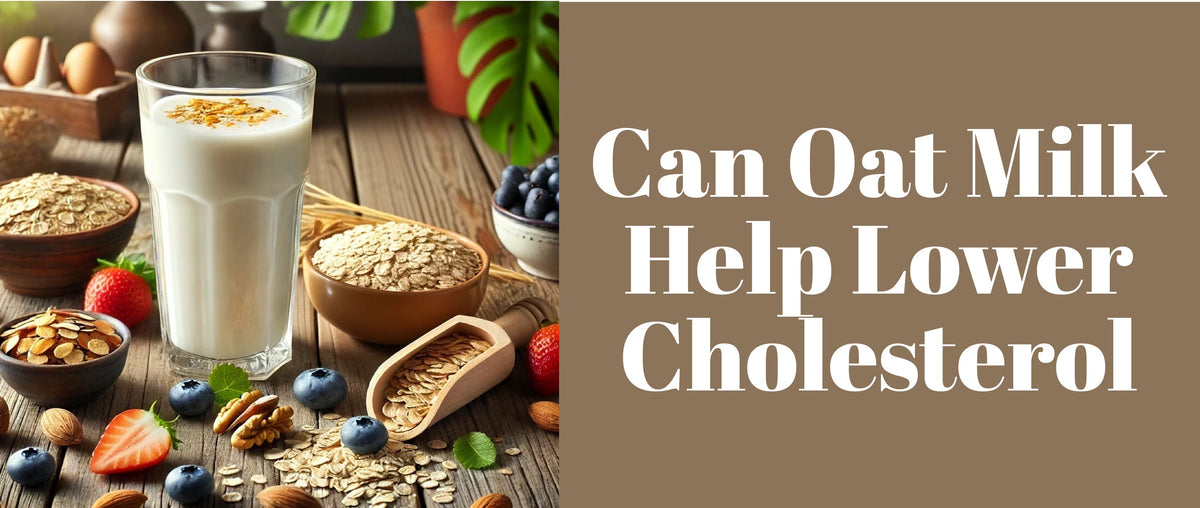Can Oat Milk Help Lower Cholesterol
As the world shifts toward healthier and more sustainable diets, Oat Milk has gained popularity as a plant-based alternative to traditional dairy. Alongside vegan staples like vegan cheese and plant based cheese , oat milk offers a creamy, nutrient-dense solution for those looking to reduce cholesterol, support healthy weight loss, and lead a healthy lifestyle.
Cholesterol management is essential for healthy living since elevated cholesterol levels are linked to heart disease, stroke, and other health complications. Many studies have shown that certain dietary changes, including the incorporation of fiber-rich, cholesterol-lowering foods like oat milk, can make a significant difference. Oat milk not only provides a creamy, versatile base for drinks like coffee and healthy smoothie recipes but also contains beta-glucan, a fiber proven to reduce LDL, or bad cholesterol levels.
This article will explore how oat milk can impact cholesterol levels, the scientific support behind its benefits, and practical ways to incorporate oat milk into a heart-healthy diet. We’ll also cover important considerations and compare oat milk to other milk alternatives, helping you make the best choice for your health.
Key Takeaways
- Oat milk contains beta-glucan, a unique fiber that can help reduce LDL (bad) cholesterol.
- Regular intake of oat milk may improve heart health when part of a balanced diet.
- Consider choosing unsweetened oat milk to avoid added sugars, which can impact cholesterol levels.
Understanding Cholesterol and Heart Health
What is Cholesterol?
Cholesterol is a waxy, fat-like substance found in every cell in your body. While your body needs cholesterol to function, high levels of LDL (low-density lipoprotein) cholesterol can accumulate in the arteries, forming plaques that narrow blood flow. Over time, high cholesterol levels can increase the risk of heart disease and stroke, impacting healthy living.
There are two primary types of cholesterol:
- LDL (Low-Density Lipoprotein): Often referred to as bad cholesterol, high levels of LDL can lead to plaque buildup in the arteries.
- HDL (High-Density Lipoprotein): Known as good cholesterol, HDL helps remove LDL from the bloodstream.
Diet plays a significant role in managing cholesterol levels. Consuming high-fiber foods and plant-based alternatives like oat milk, along with liver-healthy foods like vegetables and low-calorie fruits, can help keep cholesterol in check.
Impact of High Cholesterol on Health
High cholesterol is a silent health issue, often going unnoticed until it leads to more severe health problems. Key risks associated with elevated cholesterol levels include:
- Atherosclerosis: Hardening and narrowing of the arteries due to plaque buildup.
- Heart Attack: Occurs when plaque ruptures, blocking blood flow to the heart.
- Stroke: Resulting from a lack of blood flow to the brain due to blocked arteries.
Managing cholesterol is essential for anyone pursuing a healthy lifestyle. Incorporating cholesterol-lowering foods like oat milk can be an excellent addition to a heart-healthy diet.

What Makes Oat Milk Different from Other Milk Alternatives?
Nutritional Profile of Oat Milk
Oat milk offers a unique nutritional profile that sets it apart from other milk types, including cow’s milk and popular plant-based options like almond and soy milk. A cup of oat milk typically provides:
- 2-3 grams of fiber (including beta-glucan, a soluble fiber known for its cholesterol-lowering effects)
- 4-5 grams of protein
- Vitamin D and calcium (especially in fortified versions)
- Healthy fats without the saturated fat found in animal milk products
Compared to other options, oat milk is particularly advantageous for individuals looking for dairy-free choices that support cholesterol management. Unlike other plant based milks, oat milk contains beta-glucan, which helps absorb cholesterol and prevent it from entering the bloodstream. This fiber also supports healthy weight loss by enhancing feelings of fullness.
Benefits of Plant-Based Milk for Heart Health
Switching from animal-based milk to plant based alternatives like oat milk has several advantages:
- Low in Saturated Fats: Unlike dairy, which contains saturated fats that can elevate cholesterol, plant-based options are naturally low in or free from saturated fats.
- Cholesterol-Free: Plant-based milk, including oat milk, contains no cholesterol, making it a safer choice for those at risk of heart disease.
- Lactose-Free and Allergy-Friendly: For those with lactose intolerance, oat milk provides a safe and nutritious alternative.
Comparison of Oat Milk with Other Milk Types
| Type of Milk | Fiber (g) | Protein (g) | Fat (g) | Cholesterol (mg) | Notes |
|---|---|---|---|---|---|
| Oat Milk | 2-3 | 4-5 | 2-4 | 0 | Contains beta-glucan fiber for cholesterol reduction. |
| Cow's Milk (whole) | 0 | 8 | 8 | 24 | High in saturated fat, which can raise LDL cholesterol levels. |
| Almond Milk | 0 | 1 | 2-3 | 0 | Low-calorie but lacks significant protein and fiber. |
| Soy Milk | 1-2 | 7 | 4-5 | 0 | Higher in protein but lacks the unique cholesterol-lowering beta-glucan in oat milk. |
| Coconut Milk | 0 | 1 | 5 | 0 | High in saturated fat; limited protein and fiber content. |
Why Choose Oat Milk Over Other Dairy and Plant-Based Options?
- Fiber-Rich: Unlike cow’s milk, which lacks fiber, oat milk provides a good amount of soluble fiber (beta-glucan) that supports cholesterol management.
- Sustainable and Plant-Based: As part of a healthy lifestyle and plant based diet, oat milk aligns well with the shift toward eco-friendly, ethical choices.
- Naturally Sweet: Oats provide a mild sweetness, making oat milk a delicious option for various recipes, from coffee lattes to healthy smoothie recipes.
Beta-Glucan in Oats: The Cholesterol-Lowering Fiber
What is Beta-Glucan?
Beta-glucan is a type of soluble fiber naturally found in oats, barley, and certain types of mushrooms. Soluble fiber is known for its ability to dissolve in water and form a gel-like substance in the intestines. This gel helps absorb excess cholesterol, keeping it from entering the bloodstream. The fiber then escorts cholesterol out of the body through waste.
How Beta-Glucan Lowers Cholesterol
Research shows that beta-glucan has a direct impact on reducing LDL (bad) cholesterol without affecting HDL (good) cholesterol. The process works as follows:
- Absorbs Cholesterol: Beta-glucan binds with cholesterol in the digestive system, limiting how much cholesterol can be absorbed.
- Removes Cholesterol from the Body: The cholesterol absorbed by beta-glucan is eventually expelled from the body through digestion, helping lower overall LDL levels.
- Improves Heart Health: By reducing LDL cholesterol, beta-glucan helps maintain healthier arteries, reducing the risk of heart disease.
Scientific Evidence Supporting Beta-Glucan’s Effect on Cholesterol
Numerous studies have confirmed the benefits of beta-glucan for heart health, particularly its ability to lower LDL cholesterol:
- The American Journal of Clinical Nutrition published a study showing that consuming 3 grams of beta-glucan daily from oats led to a significant reduction in LDL cholesterol. A single cup of oat milk typically contains around 1–2 grams of beta-glucan, making it easy to reach the effective dose by incorporating it into daily meals.
- PubMed published research on oat milk consumption over five weeks, showing a notable reduction in serum cholesterol levels among participants.
Research on Oat Milk and Cholesterol Reduction
Study Results on Oat Milk’s Impact on LDL
A growing body of scientific research supports the use of oat milk for cholesterol reduction:
- A 1999 Study published in the Journal of Nutrition explored the effects of oat milk on cholesterol levels. Researchers found that daily oat milk consumption led to a significant drop in LDL cholesterol over a five-week period, without lowering HDL levels.
- The British Journal of Nutrition recently supported these findings, concluding that oat-based products like oat milk are especially beneficial for those looking to lower cholesterol while enjoying plant-based foods.
Duration and Dosage for Effectiveness
The cholesterol-lowering effects of oat milk depend on regular consumption and adequate beta-glucan intake. According to health experts, consuming around 2–3 cups of oat milk daily can provide enough beta-glucan to start reducing cholesterol levels. For those new to oat milk, it may take 4–5 weeks to observe noticeable changes in cholesterol, provided it is combined with a balanced diet and other cholesterol-lowering foods.
Comparing Oat Milk to Other Cholesterol-Lowering Foods
| Food | Cholesterol-Lowering Benefit | Suggested Usage |
|---|---|---|
| Green Tea | Contains catechins, which may reduce LDL cholesterol | Enjoy daily as a beverage alongside oat milk |
| Flaxseeds | High in fiber and omega-3 fatty acids | Add to smoothies or breakfast with oat milk |
| Fatty Fish | Rich in omega-3s, which support heart health | Consume twice weekly in heart-friendly meals |
| Low-Calorie Fruits | Provide fiber and antioxidants that support heart health | Snack on berries, apples, or pears with oat milk |
Additional Health Benefits of Oat Milk
Supports Digestive Health
With its high fiber content, oat milk is an excellent choice for supporting digestive health. Fiber promotes a healthy gut microbiome, aids regularity, and can even improve digestion. Compared to many other plant-based milks, oat milk has a naturally creamy texture and fiber-rich profile, adding both taste and digestive benefits.
Rich in Antioxidants and Heart-Healthy Nutrients
Oat milk is typically fortified with key nutrients, such as Vitamin D, calcium, and iron—all essential for heart health, bone strength, and immune function. The added antioxidants in oat milk can also help combat inflammation, supporting an active and healthy lifestyle.
Dairy-Free and Lactose-Free Benefits
For those who are lactose intolerant or allergic to dairy, oat milk provides a safe, nutritious, and versatile alternative. Its creamy texture makes it a perfect replacement for traditional dairy in everything from lattes to healthy smoothie recipes.
Potential Drawbacks or Considerations
Added Sugars in Commercial Oat Milks
Many commercial brands add sugar to enhance the flavor of oat milk. Excessive sugar intake can negatively impact heart health and may offset the cholesterol-lowering benefits. Always look for unsweetened oat milk to maximize the health benefits.
Nutritional Differences Between Homemade and Store-Bought Oat Milk
Homemade oat milk is easy to make, but it often lacks the fortifications found in store-bought versions. While it’s rich in fiber, homemade oat milk might not offer the same levels of calcium or Vitamin D unless fortified. Consider this when choosing between homemade and commercial oat milk.
Possible Allergic Reactions or Sensitivities
Some individuals may have sensitivities to oats, which can cause digestive discomfort. If you experience any issues with oat milk, try limiting your intake or exploring other options, like almond milk or cashew butter as alternatives. These options also fit well within a plant based diet and pair excellently with Vegan products.
How to Incorporate Oat Milk for Optimal Heart Health
Daily Serving Recommendations
For those aiming to reduce cholesterol levels, consuming 2–3 cups of oat milk daily is generally recommended. This provides an adequate amount of beta-glucan, which has been shown to contribute to reduced LDL cholesterol levels. The consistent intake of oat milk can yield optimal benefits, especially when combined with other liver-healthy foods and low-calorie, heart-friendly choices.
Recipes and Practical Tips
Oat milk’s naturally sweet and creamy taste makes it a versatile addition to a variety of recipes. Here are some practical ways to enjoy oat milk daily for better heart health:
- Oat Milk Latte: Replace regular milk with oat milk in your morning coffee for a creamy, cholesterol-free start to your day.
- Healthy Smoothie Recipes: Blend oat milk with low-calorie fruits like berries or apples, add a tablespoon of Cashew Butter for extra creaminess, and sprinkle in flaxseeds or chia seeds for added fiber.
- Oat Milk and Chia Pudding: Combine oat milk with chia seeds and a touch of vanilla for a fiber-rich, dairy-free pudding.
- Savory Cooking: Use oat milk as a base for creamy sauces, soups, and curries. It works especially well with dishes like Garlic Butter mashed potatoes, providing creaminess without the saturated fat of dairy.
For those looking to experiment with plant-based ingredients, oat milk pairs well with vegan cheese, such as vegan mozzarella for making a healthier, heart-friendly pizza. You can find options like best mozzarella cheese for pizza and even mozzarella cheese online if you’re opting for vegan or cholesterol-conscious recipes.

Lifestyle Tips for Managing Cholesterol Alongside Oat Milk
While oat milk is beneficial, a well-rounded lifestyle is essential for cholesterol management. Consider these additional tips to complement the cholesterol-lowering benefits of Oat Milk:
- Adopt a Plant-Based Diet: Including more plant-based foods like fat-free butter, unsalted butter, and unprocessed cheese can reduce cholesterol intake, supporting heart health. Plant-based options are typically free from animal fats, which can raise LDL cholesterol.
- Exercise Regularly: Physical activity, especially aerobic exercise, helps increase HDL (good) cholesterol and promotes cardiovascular health.
- Choose Heart-Healthy Foods: Incorporate low-calorie fruits, fat-free cheese, and liver-healthy foods like leafy greens and whole grains. These foods support heart health and work well alongside oat milk.
- Reduce Processed Foods: Processed and sugary foods can raise cholesterol and blood pressure. Opting for whole foods and vegan products helps avoid added sugars and unhealthy fats.
Conclusion
In summary, oat milk is more than a popular plant-based milk alternative—it’s a powerful addition to a cholesterol-conscious diet. With its high beta-glucan content, oat milk helps reduce LDL cholesterol levels, supports a healthy lifestyle, and provides a range of other benefits, from digestive health to weight management. Incorporating oat milk into your daily routine, along with a balanced diet rich in plant-based choices and regular exercise, can support heart health and overall wellness.
For those seeking a versatile and nutritious alternative to dairy, oat milk offers the creamy texture and nutritional profile ideal for everyday use. Whether in healthy smoothie recipes, morning lattes, or as a milk substitute in baking, oat milk can make a positive impact on your cholesterol levels and help you reach your heart-health goals.
Do you enjoy vegan food? We have a list of vegan restaurants in India to help you find delicious options in your area!










